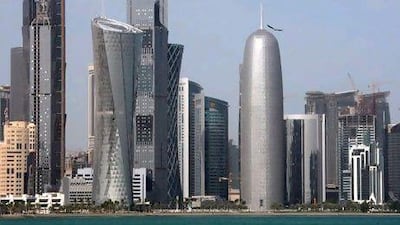Estate agents in Qatar are applauding a proposal to clamp down on unlicensed freelancers
A draft law approved by the advisory council last week would require all estate agents to register with the government and would impose fines of up to 50,000 rials (Dh50,434) on those operating without licences. The law would also regulate fees and advertisements.
"For us, it's amazing news," said Sam Youssef, the managing director of Better Homes in Qatar. "Freelancers are killing [the business]."
At present, there are no specific regulations for agents in Qatar. Property agents are required to have a general commercial licence, but there are no registration procedures or qualification standards.
Unlicensed agents operate throughout Doha, many working from their homes or cars, estate agents say.
"They undercut the market because they have no overhead," Mr Youssef said. "When you have a freelancer out there, all they want to do is make a quick buck."
There are "literally hundreds" of unlicensed agents working in Doha, said one estate agent, who asked not to be named. "Now and then you see ads in newspapers with no office information or address, just a mobile number."
Many freelancers misrepresent their contacts with landlords and charge unnecessary fees, estate agents say. Often they do not disclose conflicts of interest, such as a paid relationship with a project.
"They give a bad impression to all real estate agents," said Abbas Shafiei, the managing director of the Engel& Voelkers office in Doha.
Regulations will give clients confidence they are "dealing with a proper agent who is qualified", Mr Shafiei said.
The new law is "great news, if it pans out", he added.
The law has been discussed for years but has gained momentum only in recent months. Estate agents expect the registration process to include basic standards and a requirement that applicants provide evidence of their professional backgrounds.
"It's still not clear what the restrictions and rules will be," said Jed Wolfe, the regional associate director for Asteco, a property services company. "But it's a starting point."
Some agents expressed concern that the regulations might impose restrictions on their activities and force hiring of locals. But they said the positive aspects of the law would outweigh any initial negative repercussions.
"When you've got zero regulation, I'm all for it," Mr Wolfe said. "The good thing is it gives us a framework and body to lobby."
Qatar is still new to the international property business. The government approved freehold ownership by foreigners in designated projects only in 2006.
In addition to regulating the industry, the government is moving to officially issue freehold titles to owners and establish guidelines to offer residency status to buyers.
"I think developing a whole professional-looking real estate market is on the agenda," Mr Wolfe said.
Qatar's property market has been suffering from the same issues that have affected businesses elsewhere around the world. Many projects have been delayed or cancelled, and prices have dropped by up to 40 per cent in the past two years.
But by winning the right to host the Fifa World Cup in 2022, Qatar is expected to boost international interest in its property sector. Several large-scale master-planned projects are under development in Doha, including the Pearl, which covers 400 hectares, and Lusail, a mixed-use development that should eventually be home to more than 200,000 people.

